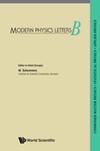Control of radiating heat on the heat transfer of polar hybrid nanofluid flow through a vertical permeable plate
IF 1.8
4区 物理与天体物理
Q3 PHYSICS, APPLIED
引用次数: 0
Abstract
The recent applications in industrial products and engineering need high thermal efficiency for the betterment of the shape of the products, the concept of hybrid nanofluid is significant in comparison to nanofluid and pure fluid. Therefore, this analysis focuses on the flow of a micropolar hybrid nanofluid over a vertical permeable plate. The study considers free convection of an electrically conducting fluid, incorporating metal and oxide components with a water-based hybrid nanofluid. Further, the conjunction of dissipative and radiating heat with generative/absorptive heat enhances the thermal properties. The use of standard transformation rules gives rise to converting the nondimensional form of concerned PDEs to ODEs. Moreover to get rid of the solution, for the nondimensional set of equations, a shooting-based numerical technique like Runge–Kutta (RK)-fourth-order is adopted for the standard values of several components within their range. The effectiveness of these parameters is studied and displayed through graphs. The computed result of the rate coefficients at the surface is depicted in tabular form. The comparative analysis with earlier work studied by considering the base liquid shows a good correlation in particular cases. However, the important outcomes are, the magnetized nano as well as hybrid nanoparticles produces a thicker momentum boundary layer thickness whereas it enhances the fluid temperature.辐射热对垂直渗透板极性杂化纳米流体传热的控制
近年来在工业产品和工程上的应用需要高热效率来改善产品的形状,混合纳米流体的概念与纳米流体和纯流体相比具有重要的意义。因此,本分析的重点是微极性混合纳米流体在垂直可渗透板上的流动。该研究考虑了导电流体的自由对流,将金属和氧化物成分与水基混合纳米流体结合在一起。此外,耗散和辐射热与生成/吸收热的结合增强了热性能。使用标准转换规则可以将相关偏微分方程的无量纲形式转换为偏微分方程。此外,对于无量纲方程组,对其范围内的若干分量的标准值采用龙格-库塔(RK)-四阶等基于射击的数值技术来消除解。对这些参数的有效性进行了研究,并通过图形显示。表面速率系数的计算结果以表格形式表示。在特定情况下,与考虑基液的前期工作进行了比较分析,结果显示出良好的相关性。然而,重要的结果是,磁化纳米粒子和混合纳米粒子在提高流体温度的同时产生了更厚的动量边界层厚度。
本文章由计算机程序翻译,如有差异,请以英文原文为准。
求助全文
约1分钟内获得全文
求助全文
来源期刊

Modern Physics Letters B
物理-物理:凝聚态物理
CiteScore
3.70
自引率
10.50%
发文量
235
审稿时长
5.9 months
期刊介绍:
MPLB opens a channel for the fast circulation of important and useful research findings in Condensed Matter Physics, Statistical Physics, as well as Atomic, Molecular and Optical Physics. A strong emphasis is placed on topics of current interest, such as cold atoms and molecules, new topological materials and phases, and novel low-dimensional materials. The journal also contains a Brief Reviews section with the purpose of publishing short reports on the latest experimental findings and urgent new theoretical developments.
 求助内容:
求助内容: 应助结果提醒方式:
应助结果提醒方式:


